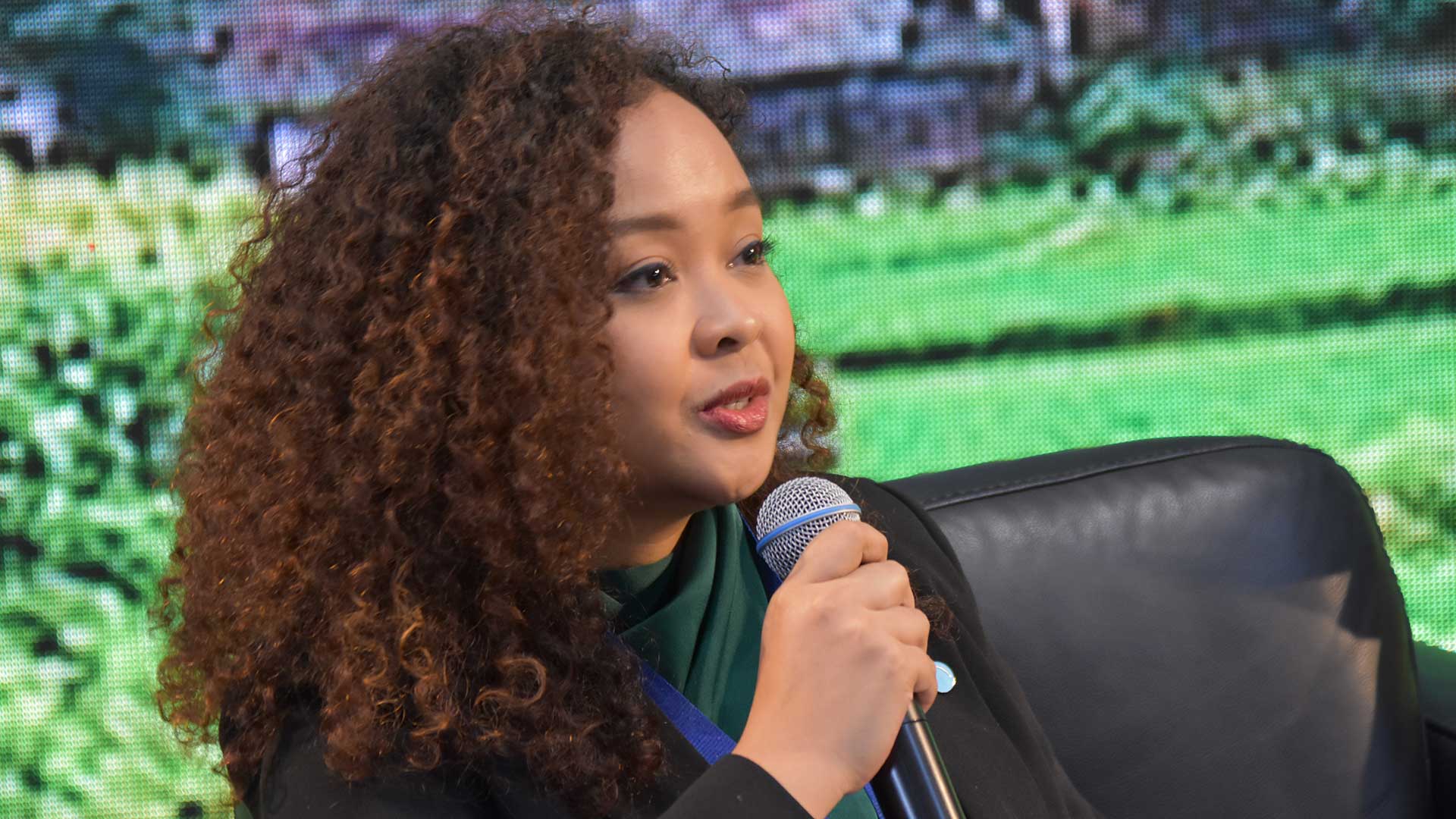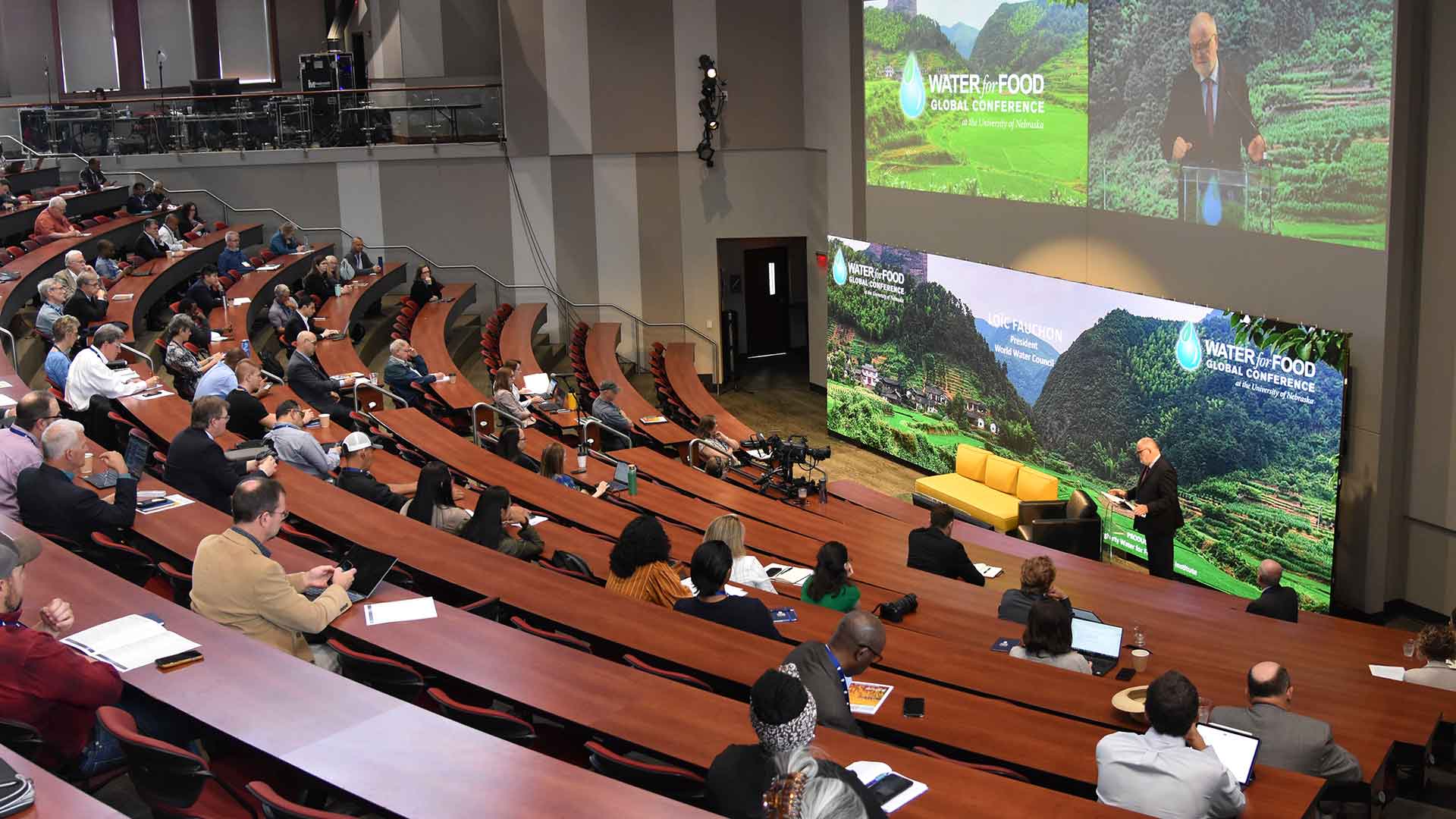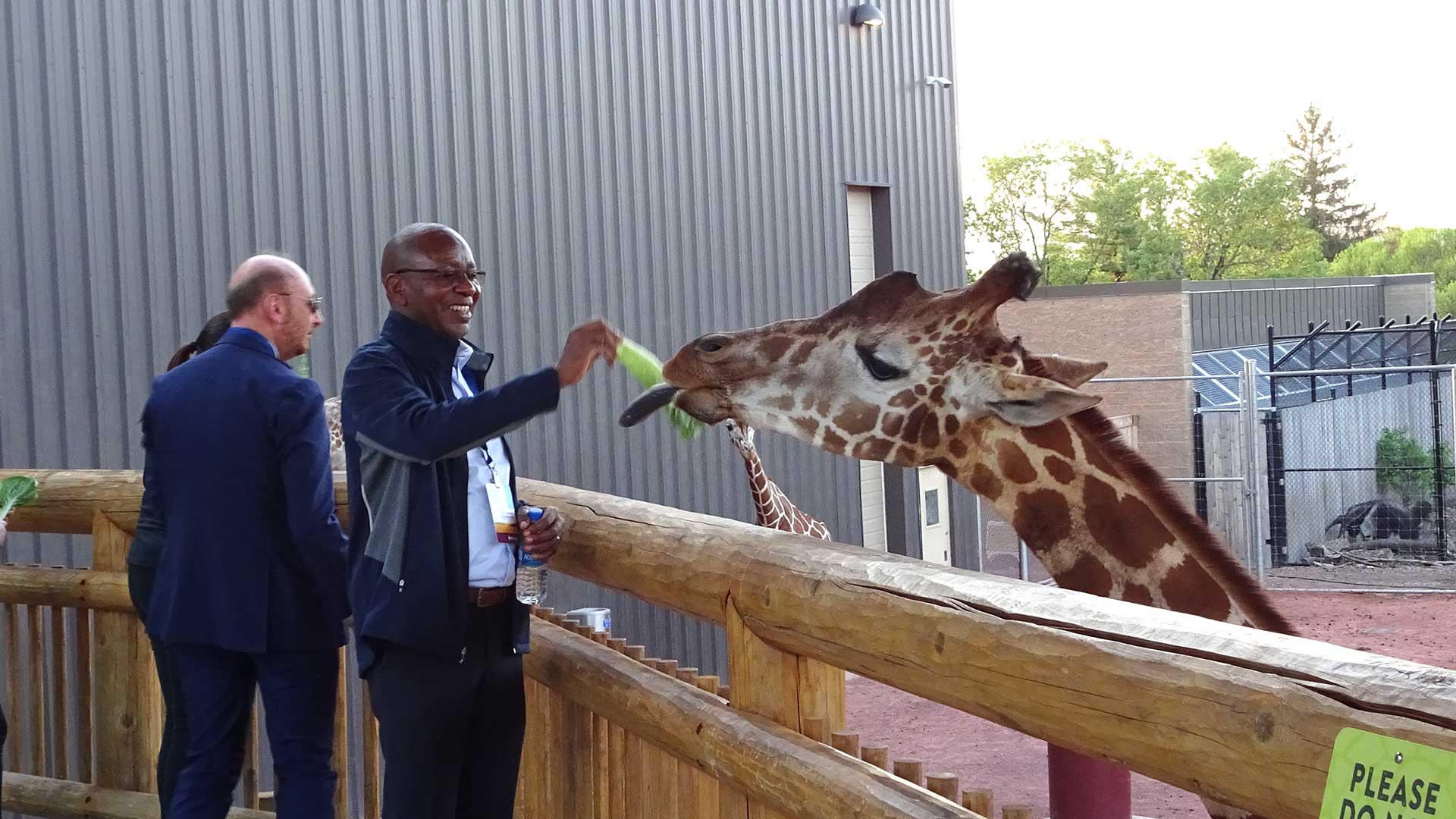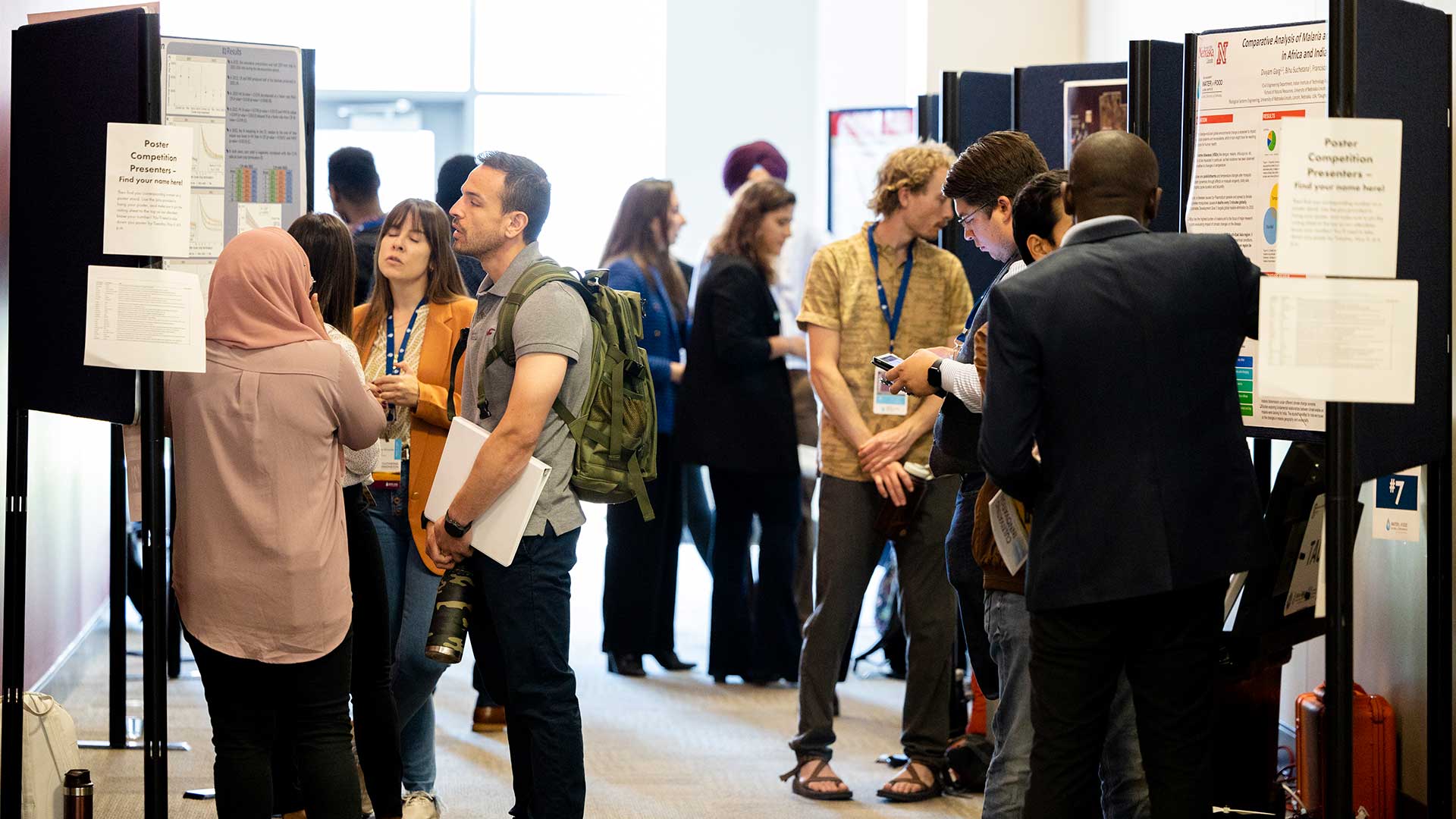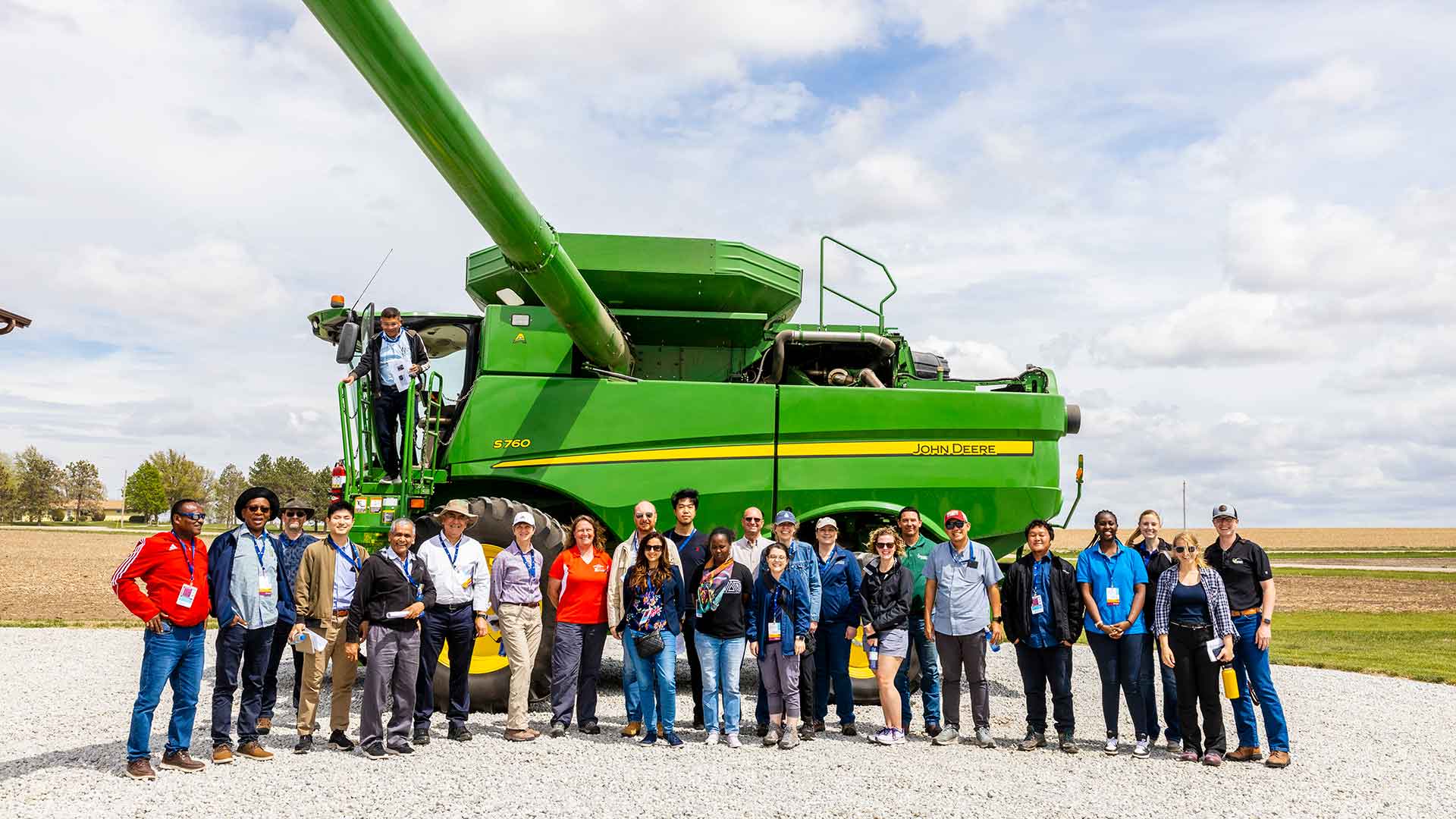Global Conference draws international audience to address water and food security
In May 2023, DWFI welcomed 425 participants from around the globe to its headquarters in Lincoln, Neb. for the tenth Water for Food Global Conference. The 2023 conference was also a partner event for the 10th World Water Forum, the world’s largest water-related forum organized by the World Water Council, on which DWFI’s executive director serves on the Board of Governors.
On the first day of the four-day event, Beth Ford, President and CEO of Land O’Lakes, touched on the importance of the conference in her Heuermann Lecture, stressing that a comprehensive, long-term water sustainability strategy is needed and shared why water is at the top of her priority list.
“Food security is national security,” said Ford. “And water is critical to production agriculture, it’s critical to communities, and to life.”
The conference, which is situated in the middle of a living laboratory and atop the vast Great Plains Aquifer, provided a platform to explore win-win scenarios to support improved water use in agriculture and increase productivity at a variety of scales – from smallholders, collectives and coops to commercial farm operations – while preserving water resources for other human and environmental needs.
Attendees from academia, government agencies, policymaking groups, nonprofits, non-governmental organizations, entrepreneurs, water managers, growers, students and private industry represented more than 27 countries and nations, with several more represented in the program’s virtual audience. The more than 35 conference sessions focused on innovative ways to improve water and food security by increasing farmers’ resiliency to a changing landscape.
“I was able to find and connect with people easily due to multiple touchpoints. The sessions were also focused and relevant, making each session insightful," said one attendee, a senior designer at International Development Enterprises (iDE). "I plan to explore the possibilities around irrigation as a service and finance models for smallholder farmer irrigation, as the examples shared and connections made could allow my organization to learn from and improve the way we support farmers to irrigate."
Sessions covered a wide range of important topics, including supporting, financing and scaling smallholder irrigation; drought, water and human health; setting corporate water targets; innovations in irrigation technology; the circular bioeconomy; sustainable crop intensification strengthening drought risk management; and land and soil management; as well as how we continue to frame the conversation surrounding water and food at future high-level, international meetings.
"I liked that [the conference] was issue oriented and mixed researchers and practitioners,” said another conference attendee, an associate director at the University of Missouri. Unlike many academic conferences, it didn't get lost in the individual research projects and papers, instead it provided a big picture view of how a variety of actors, researchers, etc., are identifying and developing activities."
Loïc Fauchon, president of the World Water Council was one of more than 120 global speakers at the event, which included representatives from universities, pivot companies, commodity boards and farmers, as well as The World Bank, The Nature Conservancy, the World Wildlife Fund, Cargill, the International Water Management Institute (IWMI), the Food and Agriculture Organization of the United Nations (FAO), the National Oceanic and Atmospheric Administration (NOAA), NASA, Catholic Relief Services, the African Union Commission, USAID, the Foundation for Food and Agriculture Research (FFAR), Bayer U.S. Crop Science, the U.S. Department of Agriculture (USDA), Valmont, the Nebraska Department of Natural Resources.
“Water and food are two of the most important priorities of tomorrow’s world,” he said. “We must stop ignoring that water is food.”
“[The conference] was issue-oriented and combined researchers and practitioners. Unlike many academic conferences, it didn't get lost in the individual research projects and papers. Instead, it provided a big picture view of how diverse actors, researchers, etc., are identifying and developing activities,” said one conference attendee.
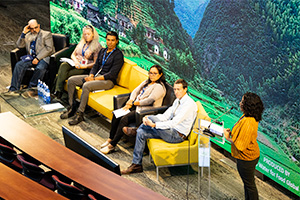
Themed, “Cultivating Innovation: Solutions for a Changing World,” the conference focused on the next generation of research, smart technology, policy development and best practices that are achieving breakthroughs in this vitally important mission.
The conference showcased Nebraska outside of the conference room to the global audience by hosting tours of a local farm and feedlot, with support from the Nebraska Corn Board, the Nebraska Soybean Board and Nebraska Cattlemen. Another site tour featured the University of Nebraska’s Eastern Nebraska Research, Extension and Education Center. The tours were an opportunity to share Nebraska’s unique water management system, how nitrates are being addressed across the state and the intertwining factors involved in Nebraska feedlot operations and other farms. Participants had the opportunity to speak with local growers about the challenges and opportunities they face.
Additionally, the Governor of Mato Grosso, Brazil, Mauro Mendes, led a delegation to the conference, meeting also with Nebraska Governor Jim Pillen and representatives from the Upper Big Blue Natural Resources District, Valmont Industries and the Lindsay Corporation. DWFI is working with the state of Mato Grosso to map its water potential in order to identify, monitor and define the sustainable use of water.
The conference featured a juried poster competition for graduate students researching water and food-related topics. Winners of first, second, third place, as well as a “people’s choice” award based on votes from attendees at the conference, received monetary awards and all participants in the competition were offered discounted registration to the full conference.
Through the conference and as evidenced through conversations with partners and attendee surveys, DWFI was able to deliver on its desired outcomes to:
- share knowledge and experience to strengthen investments and change behavior resulting in improved water and agricultural productivity;
- promote networking to support new projects and partnerships;
- increase awareness of water and food security challenges and the work being done to develop solutions.
- enhance its reputation as a results-oriented forum for advancing global water and food security research and development; and
build capacity among students, young scientists and professionals to implement solutions in water and food security.
Conference sponsors included the Lindsay Corporation, Valmont Industries, the Winthrop Rockefeller Institute, the Nebraska Corn Board, the Nebraska Soybean Board and Nebraska Cattlemen.
All conference sessions were recorded and are archived on the global conference webpage, along with conference photos and speaker slides.
FY 2023 Annual Report
- Overview
- Introduction
-
Research and Policy
-
Global
- Brazilian agricultural state looks to Nebraska and DWFI to sustainably manage water resources
- Irrigation equipment ownership not always best for smallholder farmers
- McCornick and Neale re-elected to World Water Council, DWFI involved in preparations for the World Water Forum
- Understanding the agtech ecosystem in India can spur future investments
-
Regional + National
- DAWN Project testing its decision-support tools with corn and soybean growers
- Water Center director helps City of Lincoln find second water source
- Water, Climate and Health program makes an impact in Nebraska
- DWFI's flux tower network now helps validate carbon credits
- Understanding climate’s effect on the health of Americans
- Groundwater transfer success stories guide water managers in meeting local water needs
- Advancements in crop modeling help adapt to climate change
-
Global
-
Education
- Faculty Fellows
-
Supported Students
- DWFI funds eight new students working on mission-related projects
- DWFI continues support of Platte Basin Timelapse interns
- Estimation of manure nutrient capacity in Nebraska minimizes water quality impacts
- Could cover crops replace offset in-season corn fertilizer?
- Congratulations to DWFI-supported student graduates
-
Communication
- Digital and online engagement connects DWFI with its global audience
- Coverage of DWFI research and events reaches more than 219 million people
- Creative storytelling used to amplify DWFI smallholder irrigation research outputs
- DWFI expertise tapped for national reports and publications
- DWFI staff receive well-deserved recognition
- 2022 Nebraska Water Center Annual Report now available
-
Outreach and Events
- Global Conference draws international audience to address water and food security
- On-farm event in Western Nebraska strengthens partnerships, spurs new ideas
- Engagement recovers to pre-pandemic levels
- Drought at forefront of discussions at Platte River Basin Conference
- 49th Annual Water Tour broadens knowledge about Nebraska water
- Nebraska Water Center seminars focus on hot topics in Nebraska Water
- Development
- Resources
- Search
FY 2023 Annual Report
- Overview
- Introduction
-
Research and Policy
-
Global
- Brazilian agricultural state looks to Nebraska and DWFI to sustainably manage water resources
- Irrigation equipment ownership not always best for smallholder farmers
- McCornick and Neale re-elected to World Water Council, DWFI involved in preparations for the World Water Forum
- Understanding the agtech ecosystem in India can spur future investments
-
Regional + National
- DAWN Project testing its decision-support tools with corn and soybean growers
- Water Center director helps City of Lincoln find second water source
- Water, Climate and Health program makes an impact in Nebraska
- DWFI's flux tower network now helps validate carbon credits
- Understanding climate’s effect on the health of Americans
- Groundwater transfer success stories guide water managers in meeting local water needs
- Advancements in crop modeling help adapt to climate change
-
Global
-
Education
- Faculty Fellows
-
Supported Students
- DWFI funds eight new students working on mission-related projects
- DWFI continues support of Platte Basin Timelapse interns
- Estimation of manure nutrient capacity in Nebraska minimizes water quality impacts
- Could cover crops replace offset in-season corn fertilizer?
- Congratulations to DWFI-supported student graduates
-
Communication
- Digital and online engagement connects DWFI with its global audience
- Coverage of DWFI research and events reaches more than 219 million people
- Creative storytelling used to amplify DWFI smallholder irrigation research outputs
- DWFI expertise tapped for national reports and publications
- DWFI staff receive well-deserved recognition
- 2022 Nebraska Water Center Annual Report now available
-
Outreach and Events
- Global Conference draws international audience to address water and food security
- On-farm event in Western Nebraska strengthens partnerships, spurs new ideas
- Engagement recovers to pre-pandemic levels
- Drought at forefront of discussions at Platte River Basin Conference
- 49th Annual Water Tour broadens knowledge about Nebraska water
- Nebraska Water Center seminars focus on hot topics in Nebraska Water
- Development
- Resources
- Search
Top image caption
The conference included a Heuermann Lecture by Land O’Lakes President and CEO Beth Ford
Credit: Craig Chandler | University Communications
Related Articles
DWFI expertise tapped for national reports and publications
DWFI’s research and expertise is frequently requested for respected industry publications and reports. Here is a sample of the publications.
Digital and online engagement connects DWFI with its global audience
The Water for Food Podcast continues to be a successful initiative with each new episode averaging over 1,000 downloads.
Coverage of DWFI research and events reaches more than 219 million people
Coverage of DWFI research, announcements and events in various external media outlets over the past year earned the institute a reach of more than 219 million views through 255 media mentions.
COOKIE USAGE:
The University of Nebraska System uses cookies to give you the best online experience. By clicking "I Agree" and/or continuing to use this website without adjusting your browser settings, you accept the use of cookies.


